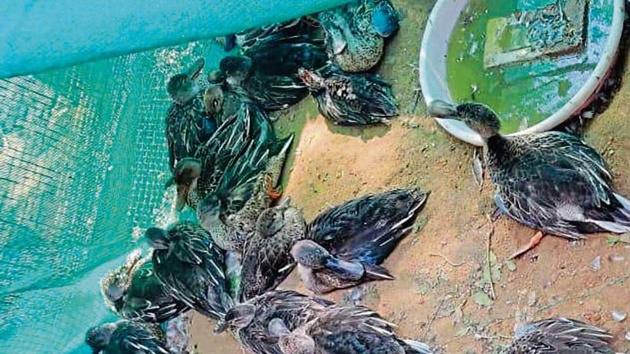Disease that killed Sambhar wetland birds not contagious: Scientists
Scientists lay to rest speculations that disease that claimed around 20,000 birds in lake could be dangerous to humans.
Scientists said on Sunday that avian botulism was not contagious, laying to rest speculations that the disease that claimed around 20,000 birds in Sambhar wetland since November 10, could be dangerous to humans.

In a meeting to discuss the future course of action on Sambhar Lake, India’s biggest inland saline wetland and one of the two Ramsar sites in Rajasthan, scientists from Wildlife Institute of Indian, Dehradun, and Salim Ali Centre of Ornithology and Natural History (SACON), Coimbatore and Indian Veterinary Research Institute (IVRI), Bareilly said the disease was not contagious and does not spread from bird to bird also.
“Birds that fed on maggot-infested carcasses got botulism. So the focus now is to clear the lake of carcasses and dispose of them scientifically,” said a scientist who didn’t want to be named because he was not authorized to speak to media.
The IVRI said on November 21 that the cause of bird mortality was botulism, a disease caused by toxin produced by bacterium Clostridium Botulinum.
Earlier, Bhopal-based National Institute of High Security Animal Disease (NISHAD) ruled out avian flu.
Meanwhile, officials from the wildlife wing of ministry of environment, forest and climate control (MoEFCC), SACON, IVRI, WII and from state forest and animal husbandry departments held a day-long meeting at Aranya Bhawan, headquarters of forest department, on Sunday.
Scientists lauded state government’s response to country’s biggest mortality of water fowls in last 30-40 years. “There’s no precedence about how to handle such a big mortality yet the state government and its various departments responded quite well to the event and have been able to clear the area to a large extent in a short time,” one of them said, requesting anonymity.
In the meeting, it was decided to quickly make the State Wetland Authority operational and monitor the wetland for next couple of months to keep things under control. “The forest and animal husbandry departments have been asked to do surveillance of the lake area,” said an official present in the meeting and who didn’t want to be named.
Earlier, Chief Minister Ashok Gehlot wrote to union environment minister Prakash Javadekar to request all possible support in order to ensure that the situation does not flare up again and other wetlands do not get affected similarly. “A joint effort of the central and state governments will go a long way in addressing a problem such as this due to ecological imbalance and climate change,” Gehlot wrote.
Thereafter, state’s principal secretary of environment department, Sreya Guha, went met environment secretary in Delhi on Friday and requested him to send a team of experts to advice the state on further management plan.






